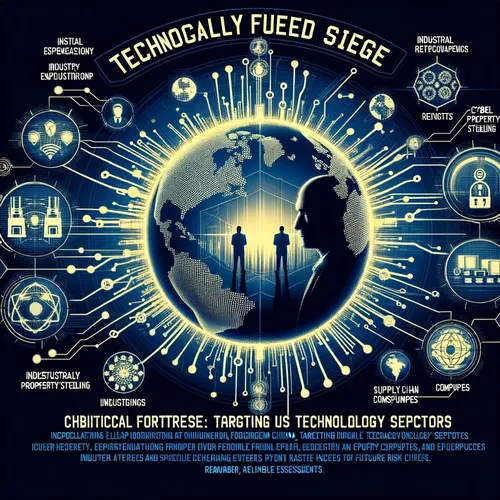Silicon Siege: China's Cyber Blitz Rocks Pentagon, Targets Taiwan's Chips in Global Hacking Frenzy
- Author
- Quiet. Please
- Published
- Mon 21 Jul 2025
- Episode Link
- https://www.spreaker.com/episode/silicon-siege-china-s-cyber-blitz-rocks-pentagon-targets-taiwan-s-chips-in-global-hacking-frenzy--67059017
This is your Silicon Siege: China's Tech Offensive podcast.
Hey listeners, Ting here—your favorite cyber sleuth with a laser eye for all things China, hacking, and high-stakes tech intrigue. The past two weeks have delivered more jaw-dropping cyber drama than a season of Black Mirror, so buckle up as we blitz through the latest on Silicon Siege: China’s Tech Offensive.
Let’s launch right in. The *biggest bombshell*—Microsoft quietly letting China-based engineers support Pentagon cloud infrastructure! This wasn’t a side gig patching printers; these engineers, working through a “digital escort” model, helped maintain super-sensitive US military systems via intermediaries. Think: a US citizen with a clearance typing in commands from a Chinese engineer, but with little clue if hidden malware or backdoors were being slipped in. Thanks, ProPublica, for blowing that secret door wide open last week. Microsoft, now under the full glare of Washington and after some senator side-eye from Tom Cotton, axed the program overnight. Defense Secretary Pete Hegseth wasted no time launching a DOD-wide probe—he wants answers in two weeks, and he wants names. Amazon, Google, Oracle—you in the hot seat too? Everyone’s wondering.
This isn’t a one-off oopsie. As Asia Times experts pointed out, when you’ve got a chronically short supply of cleared American engineers, it’s tempting for contractors to cut corners—and by corners, I mean the entire east wing of the security house. And here’s the kicker: classified info is only *some* of what’s at risk. There’s plenty more floating unencrypted, basically a cyber all-you-can-steal buffet for Beijing.
Zooming out, Chinese cyber ops are going full throttle across the globe. Mandiant, the Google-owned super-spy firm, flagged UNC3886—an elite, China-nexus group—aggressively targeting US defense, tech, and telecoms, plus critical infrastructure in places like Singapore. High-value, high-impact, and highly motivated. Meanwhile, China’s state-run digital vacuum cleaner is hoovering up secrets from telecoms and—cue the Mission: Impossible theme—especially Taiwan’s chip industry. We’re talking semiconductor blueprints and IP that powers the next gen of everything from AI to hypersonics.
And in the industrial espionage relay, Taiwan’s semiconductor giants and even their investment analysts became targets. Supply chain attacks? Check. IP theft? You bet. According to a report in Business Insurance, the pace and coordination of these hacks suggest state-backing and strategic intent—and the pattern is clear: disrupt, copy, leapfrog, repeat.
As for strategic implications, security analysts warn that the line between trade secrets and national security is gone. Satellite communications? Now a bullseye, thanks to recent mergers that give China’s cyber teams a potential backdoor to US military satcoms, as highlighted by defense strategist Rick Fisher and retired Navy intel director Jim Fanell.
So, what’s next? Industry pros like Dave Kennedy say we’re past the days of passive defense. China’s shift from passive snooping to pre-positioning itself inside US critical infrastructure—Volt Typhoon, Salt Typhoon, choose your storm—is prepping the field for potential disruption, not just espionage. The US response? Get ready for more offensive cyber moves, more decoupling, and a tighter technonationalist spiral.
Stay sharp out there, listeners. The Great Game has gone digital—and Silicon Siege is just getting started.
Thanks for tuning in. Don’t forget to subscribe, and check back for more expert takes on the global cyber chessboard. This has been a quiet please production, for more check out quiet please dot ai.
For more http://www.quietplease.ai
Get the best deals https://amzn.to/3ODvOta
